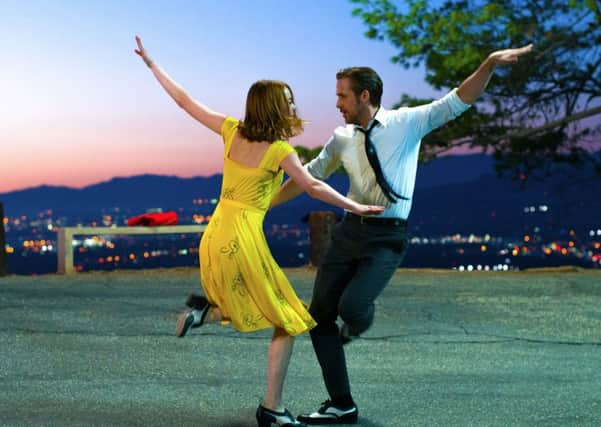Film reviews: La La Land | Manchester by the Sea | Live By Night


La La Land (12A) ***
Manchester by the Sea (15) *****
Live By Night (15) **
True to its title, La La Land seems to be inspiring the kind of head-over-heels reverie usually only displayed by those who have either fallen in love or joined a religious cult. Presented in the style of an old-school MGM musical – with a dash of Umbrellas of Cherbourg-style Nouvelle Vague cool – Damien Chazelle’s follow-up to Whiplash has already collected multiple accolades and is now the bookies’ favourite to clean up at the Oscars next month. It’s not hard to see the appeal – or indeed admire the ambition of Chazelle, who’s still in his early 30s (La La Land is only his third movie). Yet for those not immediately swept up in this love story about an aspiring actress (played by Emma Stone) and a wannabe jazz pianist (Ryan Gosling), its charms aren’t always immediately apparent and it can irritate as much as elate.
Kicking off with a ten-minute song-and-dance opus on a traffic-jammed bridge in the middle of the Los Angeles freeway, it sets its sunny and nostalgic tone from the off, expanding its shot-in-cinemascope frame to reveal the sort of choreography that, if not exactly on a par with the old movie musical masters, is at least a welcome step-up in proficiency from all those Mamma Mia-inspired free-for-alls that have brought the musical into disrepute in recent years. Still, it’s a bit of a litmus test and as the film starts running Stone’s character Mia and Gosling’s character Seb through rote professional setbacks in their efforts to follow their showbusiness dreams, it tends to overplay the cutesiness of its set-up with lots of self-referential gags about its own status as an unapologetically joyful heart-on-its-sleeve throwback to old Hollywood in an era of cynical franchise filmmaking.
Advertisement
Hide AdThe thing is, it’s hard to think of a movie that wants to be loved more than La La Land and this becomes a little problematic. In its desire to make us fall for its protagonists, for instance, it sees nothing wrong with literally presenting Gosling’s character as the saviour of jazz while setting up the film’s one black character of note (played by musician John Legend) as an artistic sell-out. To be fair to Chazelle, he does make a token effort to address this with a scene in which Legend’s band-leader Keith lectures Seb on the need for innovation to prevent jazz “dying on the vine”, but it’s clear from the look of bewilderment on Mia’s face when she watches her jazz-purist beau play with Keith’s band that we’re supposed to share her disappointment in his decision to endure success in a gimmicky fusion outfit instead of following through on his dream of opening his own club – a dilemma responsible for much of the lagging middle section.
Still, the film’s own original musical numbers are pretty decent and there’s a sweetness and melancholic edge to the way Gosling and Stone perform them. Both are rawer and less polished than professional Broadway hoofers, but that only enhances the genuine moments of cinematic magic that Chazelle does conjure up, moments in which his stars’ chemistry breaks through all the artifice and ensures the characters’ connection to one other becomes undeniable. We get a sense of this early on in a lovely scene in an old movie theatre during a screening of Rebel Without A Cause, but Chazelle reserves his knock-out blow for a phenomenal finale that begins with the sort of intense look between Gosling and Stone that great movie moments are made of. That it proceeds to upend the entire film before landing the sort of an emotional punch that leaves you floored is a true testament to Chazelle’s talent. For these 15 minutes alone, the film almost deserves everything that will likely come its way.
Another of this year’s other big awards contenders is also out this week. Manchester by the Sea is the latest from Kenneth Lonergan, whose work rate seems almost Malick-like in its infrequency, though not through his own doing. An acclaimed playwright turned screenwriter, he made his movie mark with the much-loved indie hit You Can Count on Me, but his follow-up, the ambitious, 9/11-themed Margaret, became embroiled in a nightmare lawsuit that delayed its release by six years. That’s why he’s only now delivering his third feature, but it’s very much been worth the wait. A contained story about grief and redemption, it’s as ambitious as anything he’s done – and also properly funny as well, something one wouldn’t necessarily expect from a story about a troubled man (Casey Affleck) who is reluctantly forced to become a guardian to his 16-year-old nephew. From this simple premise Lonergan weaves a wrenching drama about the complicated ways tragedy reverberates through the years, with Affleck giving the sort of unshowy performance that gradually tears you apart. He’s complemented by heartbreaking support from Michelle Williams as his ex-wife, but also from young up-and-comer Lucas Hedges, who gives a sly, multi-layered performance as his hormonally charged nephew, scoring big laughs from his character’s honest interactions with his uncle. It’s a film that quietly subverts expectations at every turn – and Affleck really is a revelation.
Affleck’s brother Ben is also in action this week in the disappointing Live By Night. Like his directorial debut Gone Baby Gone, it’s based on another novel by Boston crime writer Dennis Lehane, but Affleck – directing for the first time since Argo – just can’t quite make it come alive on screen. He’s fine in the lead, but the story’s period setting – Prohibition era America – makes it feel very staid. ■